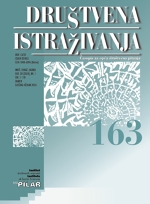ZAMOR SUOSJEĆANJA I SAGORIJEVANJE KOD STRUČNJAKA U PODRUČJU TRETMANA OVISNOSTI TIJEKOM PANDEMIJE COVID-19
COMPASSION FATIGUE AND BURNOUT IN ADDICTION WORKERS DURING THE COVID-19 PANDEMIC
Author(s): Bruno ŠKOVRLJ, Renata Glavak TkalićSubject(s): Substance abuse and addiction, Health and medicine and law
Published by: Institut društvenih znanosti Ivo Pilar
Keywords: compassion fatigue; burnout; stress; addiction workers; COVID-19;
Summary/Abstract: The aim of this research was to determine the levels of compassion fatigue and burnout in addiction workers and to assess the possibility of prediction of the variance of those variables using mental health workers' work stressors and experienced stress due to changes in working conditions during the COVID-19 pandemic. Also, the moderating effect of compassion satisfaction in the relationship between work stressors and compassion fatigue was tested. 126 addiction workers (79,7 % women) participated in this research. The following instruments were used: Oldenburg Burnout Inventory, Professional Quality of Life Scale, Mental Health Professional Stress Scale, and Perceived Stress due toChanges in Working Conditions during the COVID-19 Pandemic Questionnaire, developed for the purpose of this study. Compassion fatigue (secondary traumatic stress (STS) and burnout) was determined by client-related difficulties, home-work conflict, relationship and conflicts with other professionals and organisational structure and processes. Burnout (OLBI) was determined by workload-related stress. Compassion satisfaction was found to have a moderating effect in the relationship between work stressors and compassion fatigue. Perceived stress due to changes in working conditions during the COVID-19 pandemic predicted both secondary traumatic stress and burnout (OLBI).
Journal: Društvena istraživanja - Časopis za opća društvena pitanja
- Issue Year: 33/2024
- Issue No: 1
- Page Range: 149-169
- Page Count: 21
- Language: Croatian

